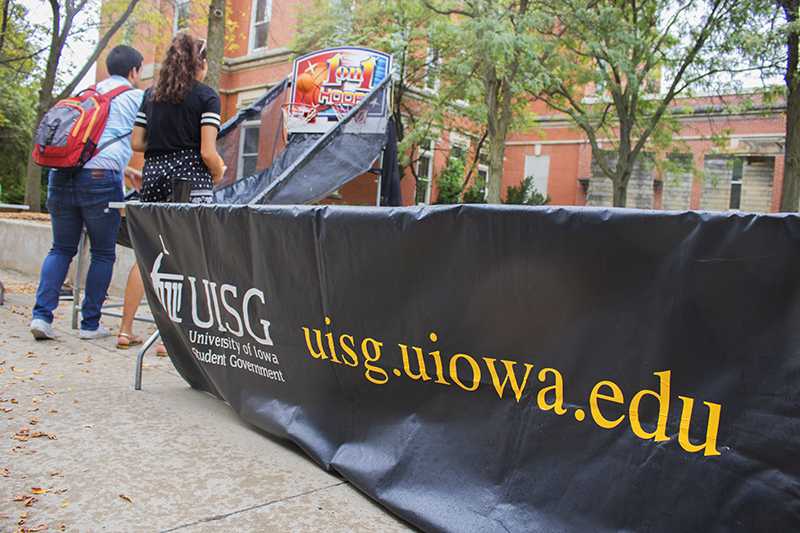Payne: Justice not served by failing to disclose potential UISG election code violation
Students shoot hoops on the T. Anne Cleary Walkway on Tuesday, September 26, 2017. UISG hosted tables where students could register to vote.
April 2, 2018
The UISG Student Judicial Court did not serve justice by failing to inform students about potential election-code violations and the resulting consequences before polls opened.
I’m rather fond of the democratic process.
When I turned 18 on Oct. 10, 2015, the very first Legal Adult Thing I did was register to vote. I’ve managed to encourage members of my family who had lost all faith in the political process and in politicians to register to vote, too.
No matter the election, I believe every vote counts. Student-government elections at the University of Iowa are no different.
Last year, the Bridge UI Party ran uncontested, and I still voted. Our turnout rate matters because when these students represent us to a variety of stakeholders and try to garner support for certain initiatives, it’s that rate they can use as evidence that the student body backs their efforts.
It may not be clear why the outcome of UISG elections matters, but it does. Those elected represent the student perspective to the university administration, city councilors and other local officials, state legislators, members of the state Board of Regents (yes, the people who vote on our tuition rates), our congressional delegation, and others.
The students we elect play a larger role in the decision-making process than many likely realize. Not to mention, the organization has quite a bit of control over the purse strings with the ability to allocate approximately $1.8 million in student-activity fee money to student organizations throughout the year.
This is why when The Daily Iowan staff reported that the UISG Student Judicial Court had reached a verdict on the UI SURGE Party’s potential election-code violation on March 26 — two days before the polls opened for undergraduates to cast their votes in UISG elections — and decided not to publicize the decision, I felt like I had been robbed of my right to cast an informed vote. Maybe it has something to do with me erring on the side of transparency as a journalist, but I have no doubt at least some of my peers feel the same way.
RELATED: Verdict reached but not disclosed on potential UISG election-code violation
Considering how contested this election is with four parties vying for the vote, and with each party making its unique call for change regarding how UISG interacts with and represents students, this lack of transparency isn’t a good look for the organization. The election is contested because students want to see organizational transformation, and that includes communication about decisions that have been made.
Understandably, people may not always be able to know everything as a decision is being made. But when the knowledge resulting from that decision could influence something like the outcome of an election, I would appreciate disclosure while the power to choose is still in my hands.
In a democratic society, elections should encourage participation from informed constituents, and these constituents can only be informed by fully understanding the circumstances under which they choose to elect someone to any position of power. This right to cast an informed vote is not to be interfered with — especially not by the branch of government that is supposed to serve as a check to the others, but in this case, failed to check itself.
I congratulate the SURGE ticket members on their election victory and want to emphasize that my disappointment is not targeted at any of the four parties that campaigned.
To the Student Judicial Court, my message is this: Justice is not served by failing to inform the electorate.















